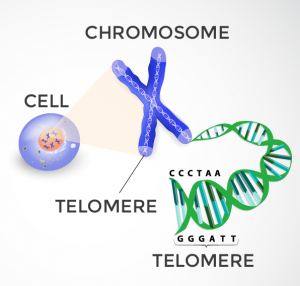Could Telomeres Unlock The Secret To Immortality?
If you don’t know the significance of telomeres, you’re likely to be hearing a lot more about it soon. Recently, scientists have glimpsed the possible future of anti ageing, and maybe even solved the mystery of immortality. If we can understand telomeres and use telomerase to “immortalise” human cells, we may be able to mass produce cells for transplantation, including insulin-producing cells to cure diabetes, muscle cells for treating muscular dystrophy, cartilage cells for certain kinds of arthritis, and skin cells for healing severe burns and wounds. Telomeres could hold the secrets to how we age and how to prevent ageing.
What are Telomeres?
Inside the nucleus of a cell, our genes are arranged along twisted, double-stranded molecules of DNA. Each one of us has 46 strands of DNA in each of our cells, coiled into chromosomes. At the tips of each chromosome, there’s a cap, like the tip of a shoe lace which keeps our DNA from fusing together and corrupting the cell’s genetic blueprint. That cap is called a telomere. Every time our cells divide, a bit of that telomere is lost. Over the course of time, telomeres become shorter and shorter. When they get too short, the cell can no longer divide; it becomes inactive or it dies.
How are Telomores Linked to Ageing?
Telomeres have been thought of as our lifeline fuse, they start shortening as soon as we’re born and when they’re gone we’re gone. In fact, forensic scientists can take DNA from a blood sample and tell you how old the person was based on how long the telomeres are. The thought is that if we can slow down this ticking clock and this shortening, we may be able to slow down ageing and live longer.
Geneticist Richard Cawthon and colleagues at the University of Utah found shorter telomeres are associated with shorter lives. Among people older than 60, those with shorter telomeres were three times more likely to die from heart disease and eight times more likely to die from infectious disease. There also is some evidence linking shortened telomeres to Alzheimer disease, hardening of the arteries, high blood pressure, and type 2 diabetes.
However, scientists have also discovered that there is an enzyme called telomerase, produced naturally in the body, that protects the tips of chromosomes and slows down telomere shortening.
In young cells, telomerase keeps telomeres from wearing down too much. But, as the body repeatedly undergoes cell division to regrow skin, bone and other cells, telomerase levels are depleted, eventually enabling telomeres to shorten. As time progresses more and more evidence builds to support the theory that telomerase prevents the decline in some kinds of cells, including stem cells, by lengthening telomeres. Telomerase has gained a reputation as a fountain of youth.
In fact, one 2010 study on ageing published in Natureperformed on rodents seems to confirm this theory. Cancer geneticist, Ronald DePinho, found when mice are engineered to lack the enzyme telomerase, they have much shorter telomeres than the control mice, age much faster and die younger. But, when the enzyme was replaced, they bounced back to health. DePinho believes “If you look at this data together, you walk away with the idea that the loss of telomerase could be a very important instigator of the ageing process” and that “this has implications for thinking about telomerase as a serious anti-ageing intervention,”.
The hope is that if science found a way to increase production of telomerase, telomeres would remain long, reducing the risk of some diseases, slowing ageing and lengthening life spans. The key to reversing the hands of time may start on a chromosomal level.
Telomerase and Links to Cancer
Scientists have discovered that measuring telomerase may be a way to detect cancer. Several studies have found that telomere shortening is strongly correlated with an increased risk of cancer. As a cell begins to become cancerous, the telomeres begin to shorten and the cell produces more telomerase enzyme in order to stop the cell from dying. In many cases, this sudden increase in telomerase production allows the cancerous cells to divide, increasing the size of a cancerous tumour. Many cancers have shortened telomeres and increased telomerase production, including pancreatic, bone, prostate, bladder, lung, kidney, and head and neck.
If scientists can learn how to stop telomerase production in the body, they might be able to fight cancer by making cancer cells age and die. In one experiment, researchers blocked telomerase activity in human breast and prostate cancer cells growing in the laboratory, prompting the tumour cells to die. But there are risks. Blocking telomerase could impair fertility, wound healing, and production of blood cells and immune system cells.
Another solution could be to increase telomerase production to decrease the chances of developing cancer in the first place. Scientists from the Spanish National Cancer Research Centre (CNIO) have discovered it is possible to increase telomerase production and telomere length through in vivo tissue reprogramming. They have been able to use telomerase in the lab to keep human cells dividing far beyond their normal limit, and the cells do not become cancerous. The paper, published in Stem Cell Reports, describes how the lengthening of telomeres and increased production of telomerase is an unmistakable sign of cell rejuvenation.
However, there are risks associated with this treatment. Although increased telomerase does increase telomere length and decrease the risk of developing cancer, in humans with cancer, the enzyme helps existing tumours grow faster. At this stage, it doesn’t seem we know enough about safely harnessing telomerase to ensure that it works only to lengthen telomeres and doesn’t actually stimulate cancer.
Natural Lifestyle Changes
Scientists claim they have evidence that explains why lifestyle changes can lengthen your telomeres and your life. The Blackburn study suggests that telomere length can be influenced by environment and lifestyle. Leonard’s Hayflick’s theory of ageing suggests that telomerase is involved in ageing and in determining an individual’s lifespan and confirms that telomerase production is influenced by certain lifestyle factors. Additionally, a study by Dean Omish provided evidence that diet, moderate aerobic exercise, stress management and support could impact on life expectancy. So how can we use these findings to slow ageing and increase our lifespan.
Stress
“Emotional stress is associated with shorter telomeres” says Ornish. “And we know that shorter telomeres are associated with an increased risk of many chronic diseases and a shorter lifespan.” A 2004 study compared two groups of healthy woman. The first group were mothers of healthy children (this was the control group) and the second group were mothers of chronically ill children (care giving mothers). The study found that on average, the care giving mothers telomeres were ten years older than the control mums. That is, their cells behaved as if one decade older. Another study examined African-American boys. Again two groups were compared, the first group of boys came from stressful environments and the second group were from stable homes. The study found that on average the boys from stressful environments had telomeres that were about 40 percent shorter than the boys from stable homes. It is clear from these findings that chronic stress contributes to ageing in a very real way.
Exercise
The benefits of exercise are already well documented. It not only provides an energy boost but is also linked to increased telomere length and longer life expectancy. A recent study found that people who did some type of exercise were three percent less likely to have exceptionally short telomeres than people who did no exercise at all. Not only that, but the finds also discovered that the more you exercise, the longer your telomeres will be. This correlation between telomere length and exercise appears to be most prominent among those who are middle aged, so it’s never too late to start a fitness programme and keep those telomeres from getting shorter. Another study about the correlation between exercise and telomere length found that on average, middle-aged adults who were intense runners (45-50 miles a week) had telomere lengths that were 75 percent longer than their peers who did little to no exercise. What’s more, London researchers studied 2,400 twins, and found that the twin who exercised more not only had larger muscles but also longer telomeres. This doesn’t mean you need to become an Olympic athlete or a marathon runner. However, it does suggest that participating in intense exercise regularly, like Cross Fit and HIIT workouts, for as little as half an hour per day can keep telomeres long and healthy. Now there’s another reason to hit the gym.
Diet
Diet is also strongly related to telomere length according to recent studies. Food that is high in vitamins and antioxidants, like berries and artichokes, are believed to protect telomeres from oxidative damage and slow down ageing. Additionally, taking multivitamins can bridge the gap between the food you are eating and what your body needs in order to lengthen telomeres. But, no matter how many supplements you take, they can’t mimic the multitude of health benefits from eating real, wholesome foods. The same study found that participants who ate foods high in vitamins C and E also had longer telomeres. Oranges, peppers and kale are among the top vitamin C foods. Almonds, spinach and sweet potatoes are the foods to turn to for vitamin E. More vegetables and fruit, and less butter are also associated with longer telomeres. However, the key to diet and longer telomeres may be avoiding saturated fat. Just 1% of saturated fat calories in your diet can add nearly a whole year of ageing to your telomeres.
Meditation
It’s time to unroll your mat and unwind. Meditation and yoga are said to be one of the most effective lifestyle changes you can make to increase your telomeres. A 2014 study compared the telomere length of breast cancers survivors and revealed that those who participated in meditation and yoga were able to keep their telomeres at the same length, whereas, those who did not participate in meditation or yoga had shortened telomeres. However, meditation comes in different forms for different people. For me, it’s spending time with loved ones without the distraction of technology or work. For others, it’s healing prayer, setting aside time to reflect, setting an intention for their day or attending a regular yoga class. Pilates is also great for meditation. Meditation can help your Pilates practice and your Pilates practice can help your meditation. It’s a win-win. Whatever your meditation looks like, it’s clear it’s good for your mind and body.
The Bigger Picture
Incorporating just one of these factors into your routine can do the world of good for your telomeres. But, to drastically increase your life expectancy, you can do as Dean Omish suggests and eat well, participate in moderate aerobic exercise, meditation and stress management. If you need any more persuading, a 2008 study among men found that after three months of a vegan diet, aerobic exercise and stress management, including yoga, there was increased telomerase activity. A 2013 follow-up study found that those lifestyle changes are associated with longer telomeres.
Further Reading
https://www.ucsf.edu/news/2013/09/108886/lifestyle-changes-may-lengthen-telomeres-measure-cell-aging
https://wakeup-world.com/2012/12/04/8-ways-to-maximize-telomere-length-and-increase-life-expectancy/
http://www.medicalnewstoday.com/releases/315675.php
https://scitechdaily.com/gene-therapy-extends-mouse-lifespan-by-24/
http://www.pnas.org/content/109/5/1743.full
http://www.wellnessresources.com/wellness-blog/posts/telomeres_the_secret_to_anti_aging/














